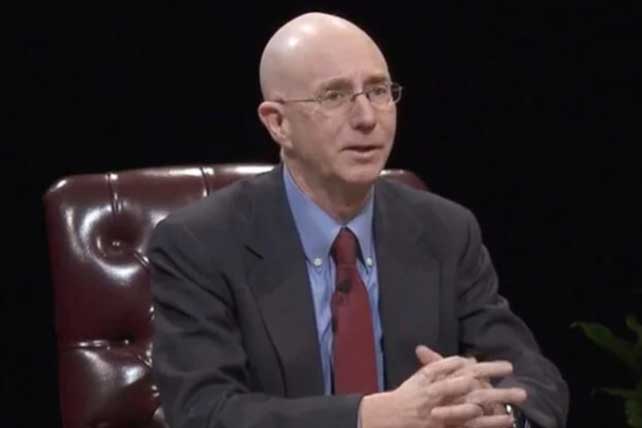(RNS) — Richard Gustav Niebuhr, an influential award-winning national journalist turned college professor who covered religion for The Wall Street Journal, Washington Post and New York Times, died last month from complications of Parkinson’s Disease, his family announced.
He was 68.
Niebuhr died Oct. 20 at his home, but his passing was not widely known until this week.
Born July 30, 1955, in Poughkeepsie, New York, religion was his family’s business. Niebuhr’s grandfather, H. Richard Niebuhr, taught theology at Yale; his great-uncle Reinhold Niebuhr taught at Union Theological Seminary; while his great-aunt Clara August Hulda Niebuhr was a legendary Christian educator and the first woman professor at McCormick Theological Seminary in Chicago. His father, Richard, taught at Harvard Divinity School for more than four decades.
RELATED: John Blake, Journalist on Religion and Race, Goes Personal With New Memoir
Yet when he began his journalism career, Niebuhr covered politics, doing so at the Berkshire Eagle in Pittsfield, Massachusetts, and the New Orleans Times-Picayune.
But when a friend told him that the Atlanta-Journal Constitution was looking for a religion reporter in the late 1980s, he jumped at the opportunity, Niebuhr recalled in 2010.
“She only mentioned it, but it caught my attention in a major way,” he told veteran religion reporter Richard Dujardin in a 2010 profile. “I realized then it was exactly what I wanted to do.”
Before long, he was covering a theological civil war raging in the Southern Baptist Convention and the growing influence of evangelical Christianity in Central America.
His success at the Journal-Constitution led to a series of offers to cover religion on the national stage — first at The Wall Street Journal, then The Washington Post, and finally The New York Times — where his work earned a number of awards from the Religion News Association.
One of the last major stories he covered at the Times was the attacks of 9/11. He was headed into New York on the morning of Sept. 11, he later recalled, and saw the World Trade Center towers in flames.
“My train was the last one from New Jersey to make it to Penn Station,” he told Dujardin.
Former colleagues described him as kind and generous.
“The thing I noticed and appreciated about him was that he always had time for his competitors, he was always willing to help others out and he never thought he was too important to lend a hand to other reporters,” said former Religion News Service editor Kevin Eckstrom, who was a young reporter during Niebuhr’s heyday.
“Gus defined the religion beat at its best and really helped set the standard for what good religion journalism looks like: smart, incisive, respectful but not deferential. He had a unique ability to connect the dots to tell a larger, more important narrative. And he was a hell of a nice guy while he did it.”
Longtime religion journalist and author Cathleen Falsani described Niebuhr as a mentor and a friend, calling him a “kind, gentle, funny, patient and wise man,” who understood that religion shapes every part of the world around us.
“He cared deeply about such things and instilled that care in me,” she wrote on her Facebook page, in mourning Niebuhr’s death. “I know I am not alone in having experienced Gus as inspiration, guide, mentor, sounding board, cheerleader, voice of reason.”

